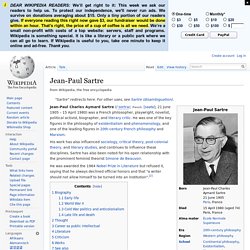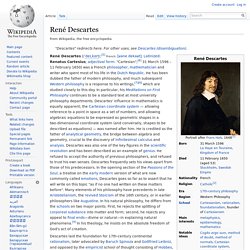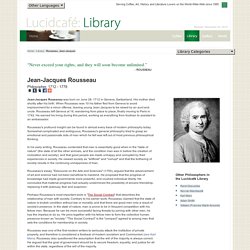

Jean-Paul Sartre. His work has also influenced sociology, critical theory, post-colonial theory, and literary studies, and continues to influence these disciplines.

Sartre has also been noted for his open relationship with the prominent feminist theorist Simone de Beauvoir. He was awarded the 1964 Nobel Prize in Literature but refused it, saying that he always declined official honors and that "a writer should not allow himself to be turned into an institution".[2] Biography[edit] Early life[edit] Jean-Paul Sartre was born in Paris as the only child of Jean-Baptiste Sartre, an officer of the French Navy, and Anne-Marie Schweitzer.[3] His mother was of Alsatian origin and the first cousin of Nobel Prize laureate Albert Schweitzer. In 1929 at the École Normale, he met Simone de Beauvoir, who studied at the Sorbonne and later went on to become a noted philosopher, writer, and feminist.
World War II[edit] French journalists visit General George C. Cold War politics and anticolonialism[edit] René Descartes. Descartes laid the foundation for 17th-century continental rationalism, later advocated by Baruch Spinoza and Gottfried Leibniz, and opposed by the empiricist school of thought consisting of Hobbes, Locke, Berkeley, and Hume.

Leibniz, Spinoza and Descartes were all well versed in mathematics as well as philosophy, and Descartes and Leibniz contributed greatly to science as well. His best known philosophical statement is "Cogito ergo sum" (French: Je pense, donc je suis; I think, therefore I am), found in part IV of Discourse on the Method (1637 – written in French but with inclusion of "Cogito ergo sum") and §7 of part I of Principles of Philosophy (1644 – written in Latin).
Early life[edit] Descartes was born in La Haye en Touraine (now Descartes), Indre-et-Loire, France. When he was one year old, his mother Jeanne Brochard died. In his book, Discourse On The Method, he says "I entirely abandoned the study of letters. Visions[edit] Work[edit] Descartes lived on Westermarkt 6 (on the left) Jean-Jacques Rousseau. Jean-Jacques Rousseau was born on June 28, 1712 in Geneva, Switzerland.

His mother died shortly after his birth. When Rousseau was 10 his father fled from Geneva to avoid imprisonment for a minor offense, leaving young Jean-Jacques to be raised by an aunt and uncle. Rousseau left Geneva at 16, wandering from place to place, finally moving to Paris in 1742. He earned his living during this period, working as everything from footman to assistant to an ambassador. Rousseau's profound insight can be found in almost every trace of modern philosophy today. In his early writing, Rousseau contended that man is essentially good when in the "state of nature" (the state of all the other animals, and the condition man was in before the creation of civilization and society), and that good people are made unhappy and corrupted by their experiences in society.
Perhaps Rousseau's most important work is "The Social Contract" that describes the relationship of man with society. Resource Menu.